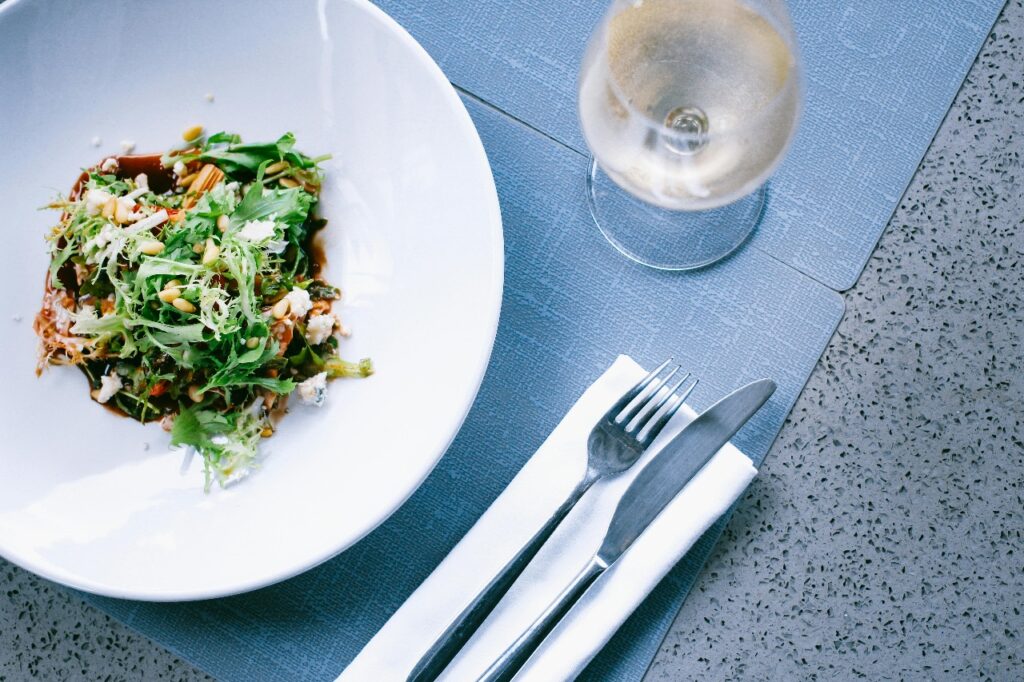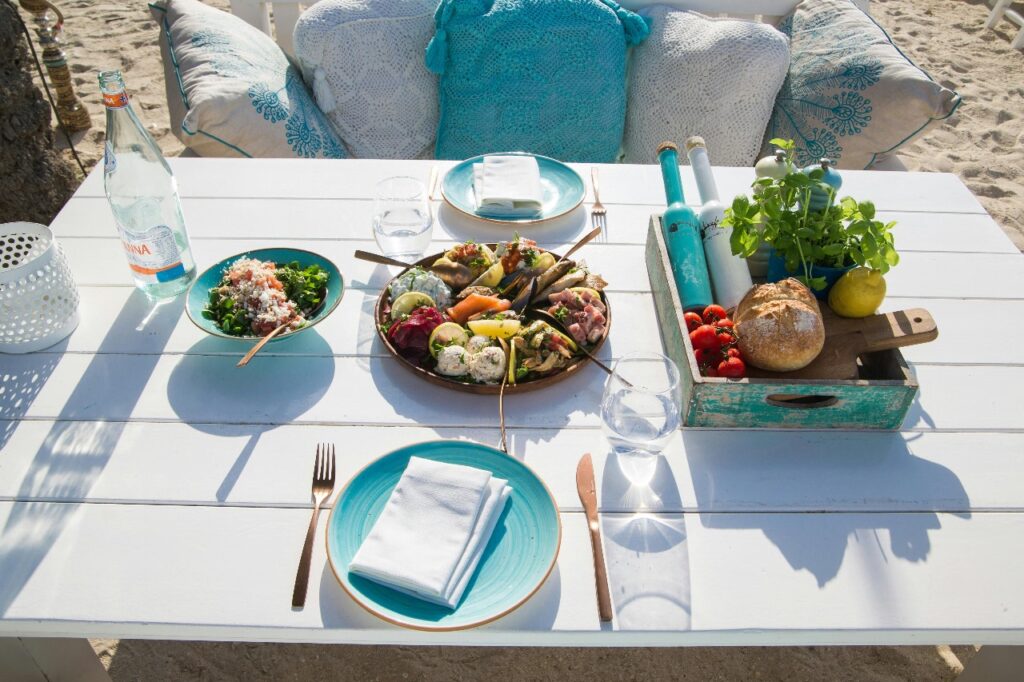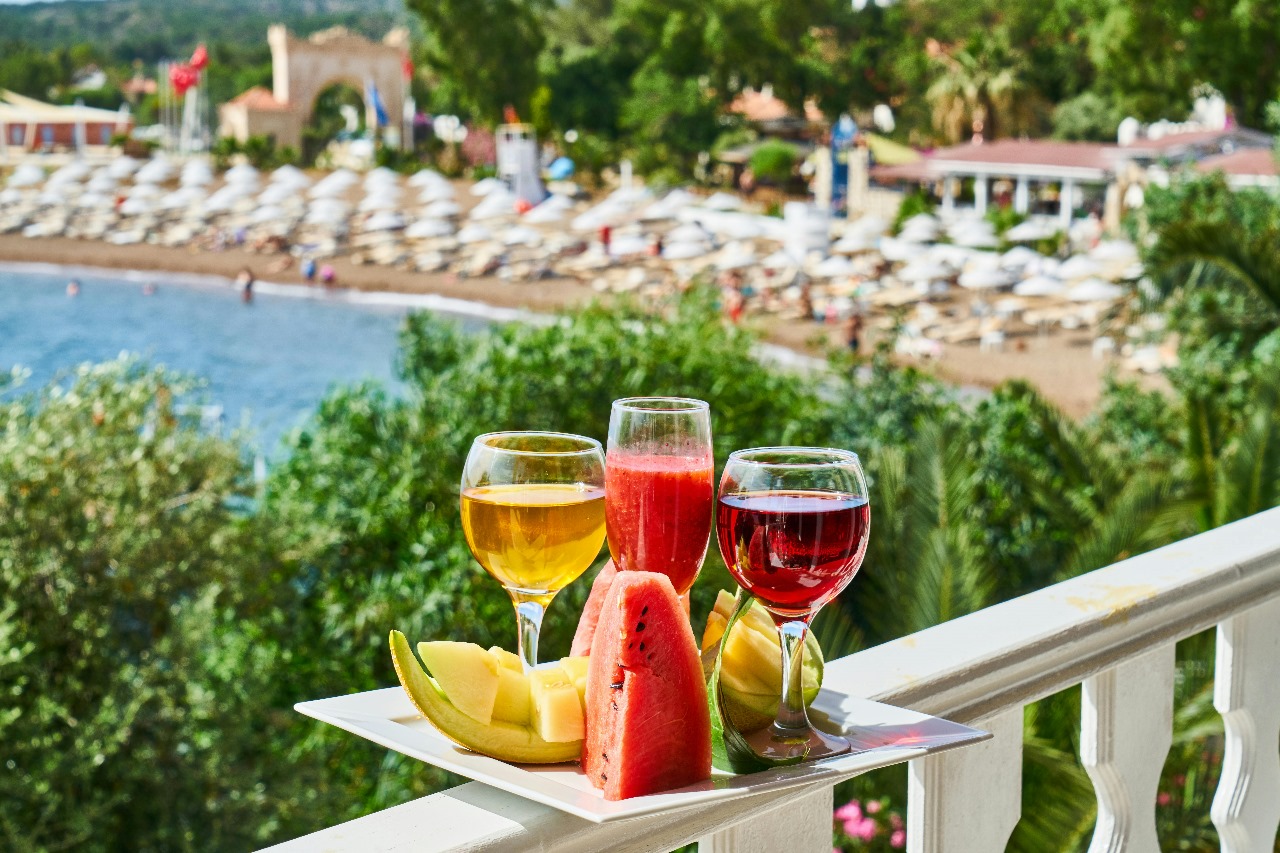The Mediterranean diet is long past being a fad. It is part and parcel of tradition in countries bordering on the Mediterranean Sea. In France, Spain, Greece, and Italy it’s a (delicious) way of life that has withstood the test of time. Living on the Costa del Sol offers much more than just perfect weather and stunning scenery. It offers an easy-going lifestyle and a healthy well-being through vibrant, fresh, and flavourful food.
The Mediterranean Diet
The Mediterranean diet follows a very simple idea: fresh, local, and seasonal. Think of ripe tomatoes in olive oil over great mixes of grains, or green salads turned into a party with a few handfuls of olives. More than foods, they are joyful and colourful celebrations of life, rich in nutrients and full of health benefits.
The Mediterranean diet is widely renowned for its potential to promote heart health, lessen inflammation, and promote greater longevity. Research findings over the years have shown that people who live by this diet have fewer instances of contracting cardiovascular diseases, lower rates of diabetes, and less prevalence of different forms of cancer. The power, however, behind such a diet is not simply one of individual food groups it is the way in which these truly nutritious ingredients are combined into meals that are at once satisfying and nourishing.
Foods in the Mediterranean Diet
The Mediterranean diet is one of the most famous diets in the world. It is characterized by great variety, balance, and focus on whole, unprocessed foods. Below are some of the main foods that constitute this diet:
Fresh Vegetables: Think of vibrant tomatoes, crisp cucumbers, sweet bell peppers, spinach, kale, eggplant, and zucchini. That is after all the base of most of the Mediterranean dishes, be it salad or stew.
Fruits: Figs, grapes, and other fruits in season like oranges and pomegranates often make an appearance in a light Mediterranean meal either as a snack or dessert; though berries, peaches, and apricots have not been known to be shunned.
Whole Grains: Common ones are barley, farro, bulgur, and whole-grain bread. Complex carbohydrates include brown rice, oats, and pasta from whole grains.
Legumes: Known for their high protein and fibre content, lentils, chickpeas, and beans are prepared in the form of soups, stews, and salads.

Nuts and Seeds: Snack on almonds, walnuts, sunflower seeds, and flaxseeds, all of which provide healthy fats and can be added to salads and yoghurt.
Healthy Fats: Extra virgin olive oil is considered the key ingredient in the Mediterranean diet. It is applied as an ingredient for cooking, in dressings, and sometimes even as a dip for the bread. Other sources of healthy monounsaturated fats include avocados.
Seafood: High consumption of fresh fish, including salmon, sardines, mackerel, and anchovy, with a consumption rate of 2–3 times weekly. In addition, consumption of shellfish such as prawns, mussels, and squid is.
Dairy: The diet has moderate amounts of dairy, mostly in the way of Greek yoghurt and cheese, which are generally eaten as feta and halloumi.
Herbs and Spices: Fresh herbs used include basil, oregano, thyme, and rosemary, to flavour food without using too much salt. Other primary ingredients or seasoning for Mediterranean recipes include garlic, onions, and lemon.
Wine: Moderate amounts of red wine are consumed during meals and, they say, are supportive of a healthy heart.

A Mediterranean Diet Daily Menu Idea
Here is one possible day of meals to get you eating Mediterranean on the Costa del Sol:
- Breakfast
A bowl of Greek yoghurt with fresh berries and a drizzle of honey and topped with a sprinkle of chopped nuts and seeds. A slice of whole-grain toast, drizzled with extra virgin olive oil, served with sliced fresh fruit including figs or oranges. Sip an herbal tea or coffee.
- Mid-Morning Snack
Either a fistful of almonds or walnuts and an apple or some grapes
- Lunch
A large salad with mixed greens, tomatoes, cucumbers, olives, and onions, topped with grilled chicken or tuna, dressed in olive and balsamic vinegar dressing. Have a small slice of whole grain bread or some hummus on the side of carrot and celery sticks.
- Afternoon Snack
A small portion of Greek yoghurt topped with a few drops of olive oil and dusted with oregano or a serving of a piece of fresh fruit.
- Dinner
Start with lentil soup or even a straightforward gazpacho. Serve with a small serving of grilled salmon or sardines and a side of oven-roasted vegetables, such as aubergine, courgette, and bell pepper, drizzled with a little olive oil and some fresh herbs. A side serving of a small portion of quinoa or whole grain pasta tossed with cherry tomatoes and fresh basil.
- Evening
Share a small glass of red wine with dinner. Satisfy your sweet tooth afterwards with a few slices of fresh watermelon or a couple of dates for dessert.
This daily guide feeds not just your body, but also the rhythm of the easy, fun way of eating that is life on the Costa del Sol. By choosing these nutrient-rich, flavourful foods you'll enjoy the fullness of all that the Mediterranean diet provides.
Embracing the Mediterranean Lifestyle on the Costa del Sol
Living on the Costa del Sol makes it easy to adopt the Mediterranean diet as part of your daily routine. Here, you are surrounded by local markets filled with fresh produce and a culture that appreciates good food and good company. Whether in a vivid market, fragrant with the smell of fresh, warm bread and juicy peaches, or enjoying leisure time over dinner in a waterfront chiringuito under the sunshade, the Mediterranean way of eating is a very integral part of life.
The unique climate of the Costa del Sol makes it possible to purchase fresh fruits and vegetables all year round, while being close to the sea ensures constant supplies of fish. The base of the Mediterranean diet is rich in omega-3s and lean protein, with an endless fish variety, while local extra virgin olive oil is rich in heart-healthy monounsaturated fats. This surely must be the secret of the resident’s longevity.

The Social and Physical Benefits of the Mediterranean Diet
But the Mediterranean diet is more than just what you eat—it's also about how you eat. Of course, the Costa del Sol is a very good place to eat. More to it, in the Mediterranean way, meals are more often shared and distributed among families and friends, thus encouraging the sharing and building of relationships and reducing stress. This communal approach to dining is as nourishing for the soul as the food is for the body.
The Costa del Sol also encourages an active lifestyle that complements the Mediterranean diet. Take advantage of the endless possibilities this place offers for outdoor activities such as a morning swim in the azure waters, a hike through the rugged hills, or simply an evening walk along the beach.
The Path to a Healthier, Happier You
Incorporating the Mediterranean diet into your life on the Costa del Sol isn’t just about following a set of dietary guidelines; it’s about embracing a lifestyle that prioritises well-being in every sense. The potent mix of very nutrient-dense food, high community bonding, and an active lifestyle is a very strong trifecta on which health and quality of life can rest.
So as you sit down for your next meal, let the flavours of the Mediterranean wash over you. Savour every bite, knowing you're not just eating well—you're living well. In Costa del Sol, health is a way of life, and the Mediterranean diet is your key to unlocking its full potential.

